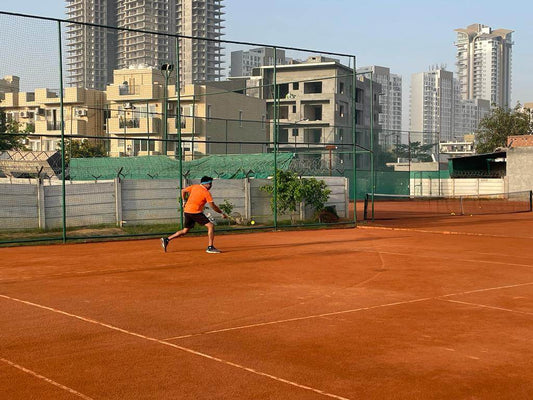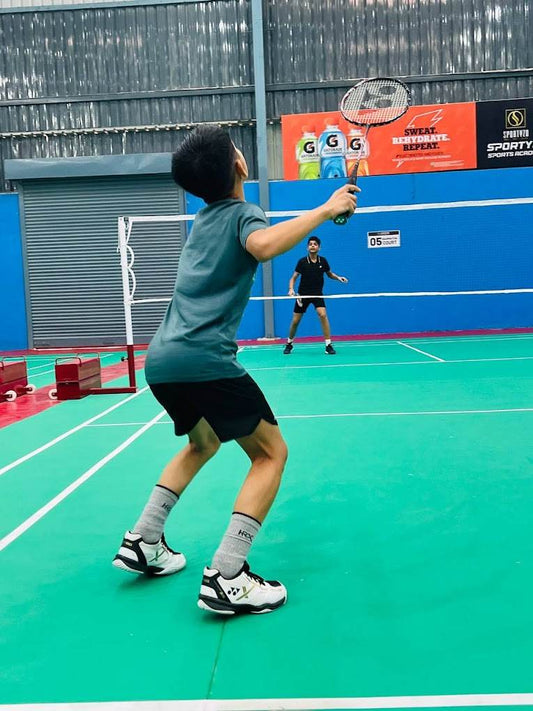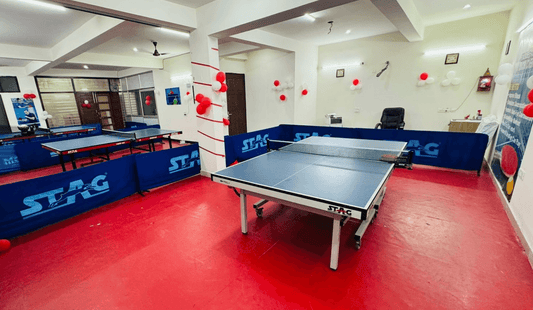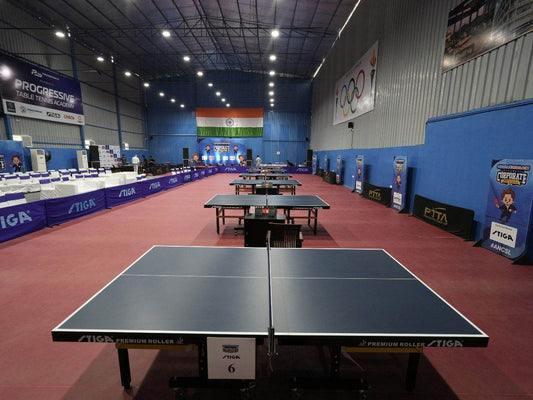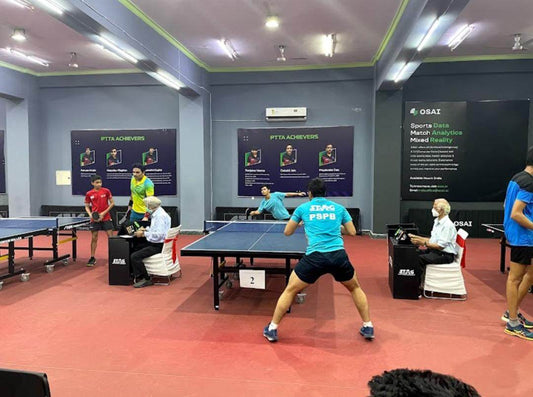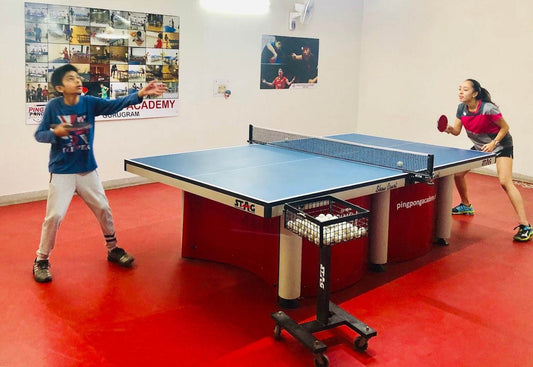-
Unified Titans Table Tennis Academy | Orchid International School Sector 55 Gurgaon
Regular price From ₹3,500Sale price From ₹3,500 Regular priceUnit price per -
Sportyzo Sports Academy for Lawn Tennis Football | Sector 65 Gurgaon
Regular price ₹3,500Sale price ₹3,500 Regular priceUnit price per -
Sportyzo Sports Academy Sector 71 for Basketball Badminton Cricket Table Tennis
Regular price ₹3,500Sale price ₹3,500 Regular priceUnit price per -
3D Table Tennis Academy | Near Swiss Cottage School Sector 23 Gurgaon
Regular price From ₹2,500Sale price From ₹2,500 Regular priceUnit price per -
Masters Table Tennis Academy | South City 1 Sector 41 Gurgaon
Regular price From ₹4,500Sale price From ₹4,500 Regular priceUnit price per -
Excellence Table Tennis Academy | Sushant Lok Phase 1 Gurgaon
Regular price From ₹5,000Sale price From ₹5,000 Regular priceUnit price per -
Progressive Table Tennis Academy | HSV Global School Sector 46 Gurgaon
Regular price From ₹3,500Sale price From ₹3,500 Regular priceUnit price per -
Progressive Table Tennis Academy | Sports Town 65 Sector 65 Gurgaon
Regular price From ₹4,500Sale price From ₹4,500 Regular priceUnit price per -
Ping Pong Academy for Table Tennis Coaching | Sector 15 Gurgaon
Regular price ₹12,000Sale price ₹12,000 Regular priceUnit price per -
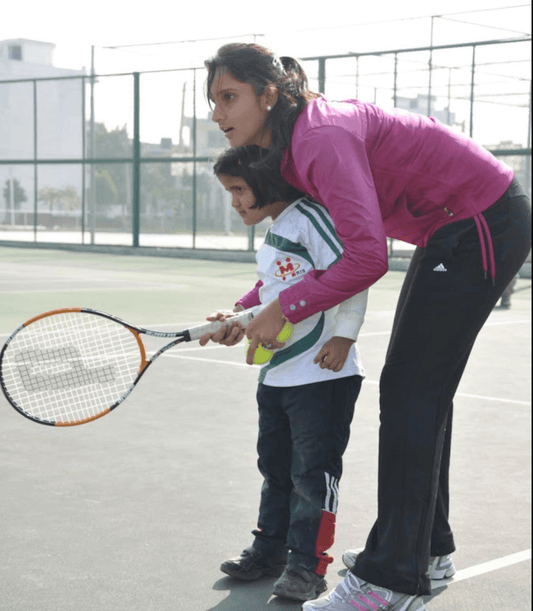
Ryders Sports Academy | Cricket Tennis Basketball Badminton | Sushant Lok 2 Sector 57 Gurgaon
Regular price From ₹12,500Sale price From ₹12,500 Regular priceUnit price per -
Path Of Music Academy for Music Dance Classes | Huda Market Sector 23 Gurgaon
Regular price From ₹3,500Sale price From ₹3,500 Regular priceUnit price per
About Table Tennis Coaching in Gurugram
Table Tennis Coaching: Mastering the Fast-Paced Sport
Table tennis, also known as ping pong, is a fast-paced and dynamic sport enjoyed by millions worldwide. With its combination of quick reflexes, strategic shot placement, and precise technique, table tennis offers not only an exciting challenge but also an excellent way to improve overall fitness. Whether you're looking to play competitively or just enjoy the sport recreationally, table tennis coaching can provide the guidance, structure, and feedback needed to elevate your game.
This comprehensive guide will delve into the essentials of table tennis coaching, the benefits of training, and what you can expect in a coaching session, along with some lesser-known tips to enhance your skills and performance.
What is Table Tennis Coaching?
Table tennis coaching refers to the structured teaching and training provided by experienced coaches to help players improve their table tennis skills. Whether you are a beginner learning the fundamentals or an experienced player seeking to refine your technique, coaching can be tailored to your specific needs. Coaching typically involves both technical training, which focuses on stroke mechanics and footwork, and tactical training, which emphasizes strategy and decision-making during matches.
Table tennis coaching is offered in various settings, including individual one-on-one sessions, group lessons, or team coaching. Coaches will often assess a player's current skill level and design a training program aimed at improving specific aspects of their game. These may include improving stroke efficiency, enhancing reaction time, learning how to read the spin of the ball, or mastering the mental aspects of the game.
Key Elements of Table Tennis Coaching
When participating in table tennis coaching, you can expect to focus on several key areas:
1. Basic Technique and Stroke Development
The foundation of a great table tennis player starts with mastering the basic techniques and strokes. These include:
- Forehand and Backhand Strokes: These are the fundamental strokes used in table tennis. A coach will teach proper grip, posture, and the correct motion for each stroke.
- Serve: The serve is arguably the most important shot in table tennis. A coach will work with players on both the technique of serving and the tactics involved, such as generating spin and placement to make the serve unpredictable for the opponent.
- Smash and Loop: The smash is a powerful shot aimed at finishing the point, while the loop is a spin-heavy shot typically used to control the rally. Learning to execute these shots effectively can change the course of a game.
- Chop: The chop is a defensive stroke that imparts heavy backspin on the ball, usually used when playing against aggressive opponents.
2. Footwork and Positioning
In table tennis, quick footwork is essential to get into the right position for each shot. A coach will emphasize lateral and forward movement, as well as how to quickly adjust to the opponent’s shots. Good footwork allows players to stay balanced and in control, even during fast-paced rallies.
3. Spin and Control
One of the key challenges in table tennis is the manipulation of spin. Players need to learn how to generate and respond to different types of spin, including top-spin, backspin, sidespin, and no-spin. A coach will help players understand how to use their paddle's angle and the speed of their strokes to create the desired spin and how to read and counteract the opponent’s spin.
4. Mental Toughness and Strategy
Table tennis is not just about physical skills; mental toughness and strategy play a huge role in winning matches. A coach will help players improve their concentration, stay calm under pressure, and develop strategies to exploit an opponent’s weaknesses. A coach might teach players how to analyze an opponent’s playing style, adjust tactics during a match, and stay mentally focused during long rallies or crucial points.
5. Match Play and Tactics
Coaching includes structured drills that simulate match conditions, where players practice real-game scenarios. Coaches will often play mock games with their students or have them compete against other players. This provides a chance to apply learned techniques in a live setting. The coach will offer guidance on positioning, shot selection, and how to read the opponent's movements during rallies.
What to Expect in a Table Tennis Coaching Session
Each coaching session may vary depending on the coach's teaching style and the player's skill level, but a typical session may include the following components:
1. Warm-Up and Conditioning
Before diving into specific drills, most coaching sessions will begin with a warm-up to prepare the body for intense activity. This may include light cardiovascular exercises, dynamic stretching, and simple rally drills to get the player into rhythm. Warm-ups help prevent injuries and ensure that players are physically prepared for the session.
2. Skill Development Drills
A significant portion of the session will focus on building specific skills. These drills are designed to improve different aspects of table tennis, such as:
- Serve practice: Working on consistency and spin techniques.
- Stroke refinement: Practicing forehand and backhand strokes with an emphasis on correct technique.
- Footwork drills: Training movements like side-to-side steps or quick positioning for shots.
- Spin awareness: Practicing how to generate spin and how to return shots with spin.
The coach will offer real-time feedback on the player's form, technique, and execution.
3. Game Simulation and Tactics
Once the player has worked on their technique, coaches will often simulate a match scenario, where players put their skills to the test. During this part of the session, coaches may provide valuable tactical advice, teaching players when to play aggressively and when to focus on defense. Coaches will also guide players through match situations, teaching them how to adjust their strategy based on the opponent's behavior.
4. Cool-Down and Feedback
The session will typically end with a cool-down period, where players perform stretches or light movements to prevent muscle stiffness. During the cool-down, the coach may offer feedback on the session, highlighting areas of improvement and giving the player a sense of what they should focus on before the next session.
Benefits of Table Tennis Coaching
Table tennis coaching offers several benefits, both physically and mentally. Here are some of the unique advantages:
1. Improved Reflexes and Coordination
Table tennis is a fast-paced sport that requires quick reflexes and excellent hand-eye coordination. Regular coaching sessions improve these skills, which are transferable to other sports and activities.
2. Increased Agility and Endurance
Table tennis involves quick footwork, rapid changes of direction, and sustained effort over extended periods. This helps build agility and cardiovascular endurance, which contributes to better overall fitness.
3. Strategic Thinking and Decision-Making
Table tennis is often described as "chess on a table" due to the level of strategic thinking involved. Learning to anticipate your opponent’s next move, control the pace of the game, and use tactics effectively can sharpen your decision-making skills both in and out of the game.
4. Stress Relief and Mental Focus
The fast-paced nature of table tennis requires concentration and focus. Regular play can act as an effective stress reliever, providing an opportunity to disconnect from daily stressors and engage in a mentally stimulating and enjoyable activity.
5. Increased Confidence
Improvement in any sport, including table tennis, boosts self-esteem and confidence. As you refine your skills through coaching, you gain more confidence in your ability to play and perform under pressure, whether in practice or competitive settings.
6. Versatility and Social Interaction
Table tennis can be played both recreationally and competitively, offering something for everyone. Coaching helps you develop the skills necessary for both, and it is an excellent way to meet new people, especially when participating in group coaching or joining a club.
Why You Should Consider Table Tennis Coaching
Table tennis coaching is a valuable investment in both personal and athletic development. Whether you’re new to the sport or aiming to compete at a higher level, professional coaching can significantly enhance your game. With a focus on technique, strategy, and mental focus, coaching sessions provide the structure and expertise you need to become a more skilled, confident, and strategic player.
Coaching not only hones your table tennis skills but also promotes fitness, agility, and mental clarity, making it a holistic form of exercise and recreation. Whether you're looking to improve your game for fun or compete at a high level, table tennis coaching can be the catalyst for your growth and success in this exciting and dynamic sport.

